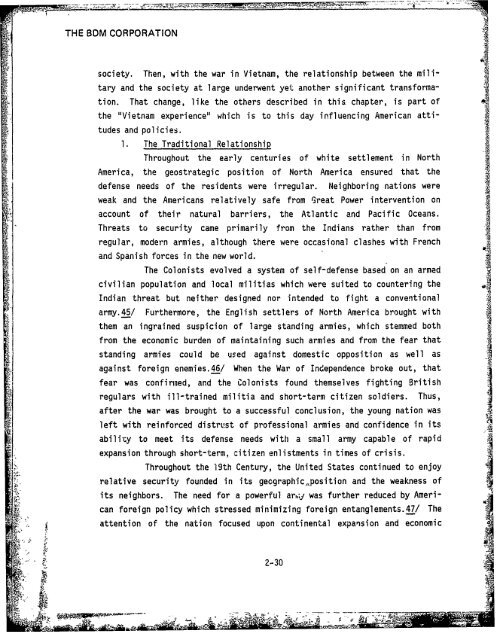policy - The Black Vault
policy - The Black Vault
policy - The Black Vault
You also want an ePaper? Increase the reach of your titles
YUMPU automatically turns print PDFs into web optimized ePapers that Google loves.
THE BDM CORPORATION<br />
society.<br />
<strong>The</strong>n, with the war in Vietnam, the relationship between the military<br />
and the society at large underwent yet another significant transformation.<br />
That change, like the others described in this chapter, is part of<br />
the "Vietnam experience" which is to this day influencing American attitudes<br />
and policies.<br />
1. <strong>The</strong> Traditional Relationship<br />
Throughout<br />
the early centuries of white settlement in North<br />
America, the geostrategic position of North America ensured that the<br />
defense needs of the residents were irregular. Neighboring nations were<br />
weak and the Americans relatively safe from Great Power intervention on<br />
account of their natural barriers, the Atlantic and Pacific Oceans.<br />
"Threats to security came<br />
primarily from the Indians rather than from<br />
regular, modern armies, although there were occasional clashes with French<br />
and Spanish forces in the new world.<br />
<strong>The</strong> Colonists evolved a system of self-defense based on an armed<br />
civilian population and local militias which were suited to countering the<br />
Indian threat but neither designed nor intended to fight a conventional<br />
army.45/ Furthermore, the English settlers of North America brought with<br />
them an ingrained suspicion of large standing armies, which stemmed both<br />
from the economic burden of maintaining such armies and from the fear that<br />
standing armies could be used against domestic opposition as well as<br />
against foreign enemies.46/ When the War of Independence broke out, that<br />
fear was confirmed, and the Colonists found themselves fighting British<br />
regulars with ill-trained militia and short-term citizen soldiers.<br />
Thus,<br />
after the war was brought to a successful conclusion, the young nation was<br />
left with reinforced distrust of professional armies and confidence in its<br />
ability to meet its defense needs with a small army<br />
capable of rapid<br />
expansion through short-term, citizen enlistments in times of crisis.<br />
Throughout the 19th Century the United States continued to enjoy<br />
relative security founded in its gecgraphicposition and the weakness of<br />
its neighbors.<br />
<strong>The</strong> need for a powerful ar,.; was further reduced by American<br />
foreign <strong>policy</strong> which stressed minimizing foreign entanglements.47/<br />
attention of the nation focused upon continental expansion and economic<br />
<strong>The</strong><br />
2-30
















